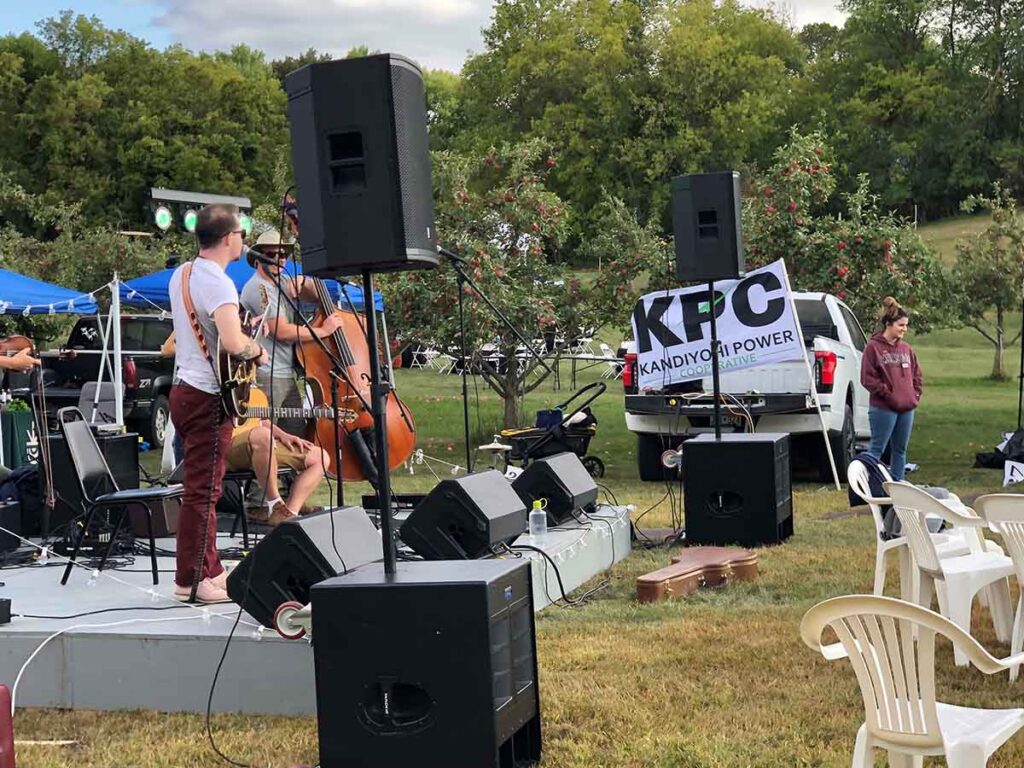
On a crisp fall day in an apple orchard in central Minnesota, people gathered to listen to The Goodtime Gals and the Mississippi Hot Club bands perform at a harvest festival.
But what the 200 or so festivalgoers weren’t expecting was that the sound coming through the speakers was being brought to them courtesy of the battery power of an electric pickup truck owned by their local electric cooperative.
In what just may be the most creative public demonstration by an electric co-op of what an EV can do, Spicer-based Kandiyohi Power Cooperative brought its Ford F-150 Lightning to power the bands’ speakers, amplifiers, LED lights, mixing console and other equipment. Electrical cords stretched out straight from the stage to the pickup, which has outlets in the cab, the truck bed and in a special front trunk.
For the next six hours, the truck’s Pro Power Onboard, which turns the vehicle into a big power bank on wheels, provided electricity to the concert in both daylight and darkness without a hitch. It also attracted interest from concertgoers, who were informed by the bands that the co-op’s EV was powering the event.
People were surprised to learn that the concert used only about 6% of the pickup’s capacity of 131 kilowatt-hours, said co-op data analyst Christopher Radel, who brought the Lightning to the concert and erected a big “KPC” sign next to the truck.
“Right at the beginning, people were making some very skeptical comments, like ‘we hope you can make it back,’” Radel said. “But when I told them we had only used about 1% of capacity over the course of an hour, the discussion started to shift to the potential benefits of the vehicle for doing work on a farm or going camping or ice-fishing.”
KPC CEO Ryan Nelson said the co-op acquired the F-150 Lightning in the fall of 2022 as a way to learn more about how an electric pickup truck would work in rural Minnesota, where frigid winters and a lack of high-speed charging stations can make driving EVs a challenge. Nelson drove it for the first year to test its performance as a daily vehicle, and he is now turning it over to the co-op’s line supervisor to see how it will fit into their fleet.
“We’re trying to cut through the skepticism that a lot of people in this area have to give them facts about how EVs actually perform in the real world,” Nelson said. “If you have a 200-mile round-trip commute in the winter, this particular electric truck might not be the vehicle for you. But if you work locally, this truck is a great option.
“We’re trying to learn as much as we can and use our own experiences to provide advice to those who are interested, allowing them to make informed decisions. We want our member-owners to have a good experience.”
KPC was invited to power the Sept. 16 concert by festival organizers, who had seen the truck used to provide electricity for a single band for a couple of hours outside the local club-level baseball stadium where the co-op holds its annual member-appreciation event.
“The concert was out in the orchard, and they didn’t have electrical outlets nearby,” Radel said. “I was a little anxious as we hooked things up because it was a lot of equipment and I wanted to make sure the power didn’t stop in the middle of their concert. The two bands were super excited about it. They said, ‘We could do this and play wherever we want to.’”
KPC has already received requests to bring its electric pickup truck to other outdoor events for Halloween and beyond. Radel said the small co-op, which has 24 employees and about 8,900 members, is working to balance the Lightning’s use as an educational tool and a work vehicle.
“When we agreed to help the festival organizers, I don’t think KPC understood how engaging this demonstration would be,” Radel said. “It’s been a great way to get people talking about EVs.”
Erin Kelly is a staff writer at NRECA.